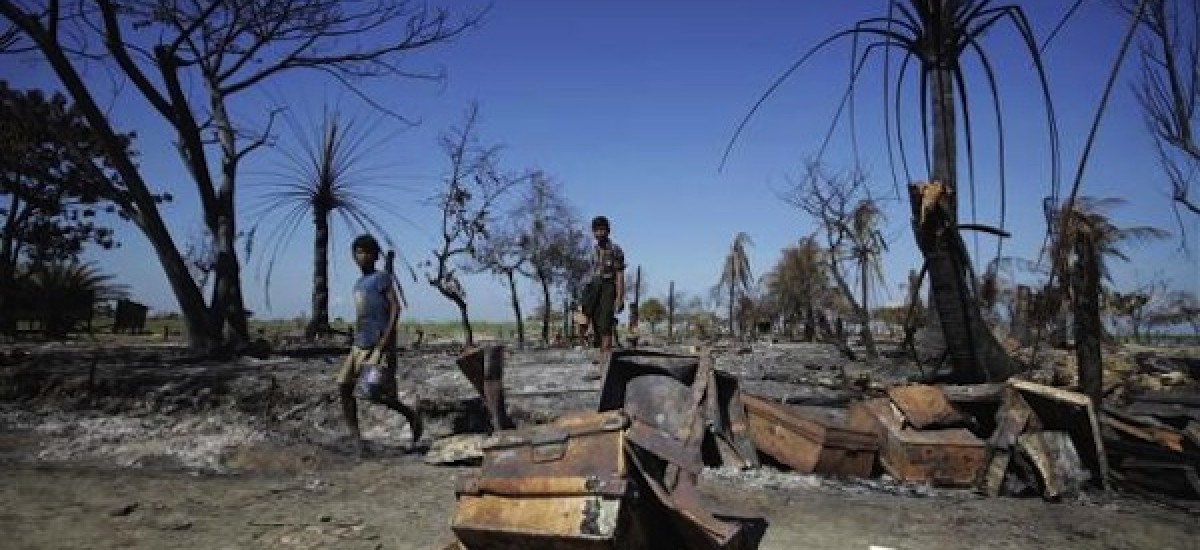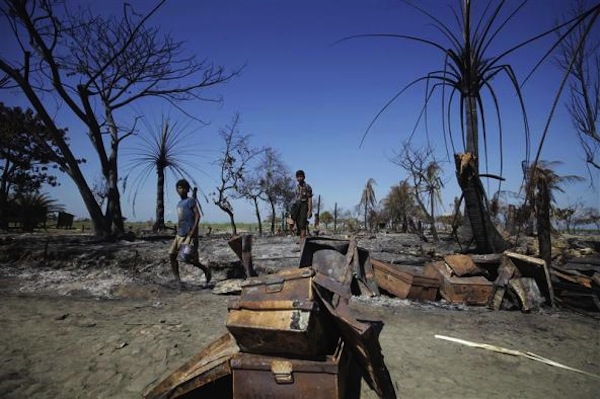People collect pieces of metal from the rubble of a neighbourhood in Pauktaw township that was burned in recent violence October 27, 2012. REUTERS/Soe Zeya Tun (Caption and content from Reuters)
Sri Lanka’s long relationship with Burma is something that anyone who has even a nodding acquaintance with Sri Lankan history is aware of. In both nations, Theravada Buddhism has been a vital political idea that has cemented the legitimacy of monarchs. Both Burma and Sri Lanka saw a Buddhist revival as a response to colonial occupation, a revival which has allowed Buddhism to fuse with nationalism as both countries achieved their independence.
With such a similar and connected past, it should come as no surprise that the Bodu Bala Sena’s manifesto echoes that of the 969; an extremist Buddhist organization in Myanmar that seeks to ethnically cleanse Myanmar of Muslims, who make up 4% of the country’s population. The 969 take their title from Buddhist numerology and have styled themselves as defenders of the Buddhist faith and more importantly, protectors of a Buddhist nation. They are led by a monk named Wirathu, who has been inciting religious hatred as far back as 2003.
The 969 propound that the Muslim community is destroying the Buddhist way of life, and thus the very fabric of society, but much of their rhetoric is meant to stir up economic resentment as well as nationalist fervour. They accuse the Rohingya of monopolizing industry and preventing wealth from trickling down to poorer ‘true’ Burmese citizens. And in an effort to rectify this alleged injustice the 969 has promoted wide scale boycotts of Muslim owned stores and enterprises, encouraging Buddhists to patronize Buddhist businesses instead, which are now distinguishable by the 969 stickers they sport on their storefronts. This is similar to the tactics of the BBS in Sri Lanka, where Muslim shops in Kurunegala have been told to close down by the 31st of March and the organization openly handed out leaflets in Maharagama, telling Buddhists not to shop at No Limit. Despite having a religious and nationalist agenda, the rhetoric of both these extremist groups revolves around economic discrimination to implement it.
The aims of the Bodu Bala Sena and 969 may be similar but they have very different means of spreading their ideology. For instance the Bodu Bala Sena has a frequently updated website and Facebook page, despite attracting critics who post comments along the lines of “die extremists!” on their wall. While their views are anything but progressive, their methods certainly are and they are quite at ease with technology and social media.
By contrast Myanmar’s low internet penetration and long history of censorship mean that such a campaign would be pointless; 969 does not even have a Wikipedia page. Instead its ideology is disseminated through sermons and the distribution of anti-Muslim leaflets. The organization uses the existing religious infrastructure to transmit these opinions, particularly the monastic schools which have become a driving force in the education of poorer Burmese who have no access to state schools.
Myanmar’s isolation from the rest of the world has allowed the agenda of the 969 to go mostly unnoticed by mainstream international media. Yet the effects of its hate-mongering have now come to a head. Last week a dispute between a Buddhist customer and a Muslim shopkeeper sparked a wave of violence against the Muslim Rohingya community in the Burmese state of Meikhtila. The three days of rioting have led to 40 casualties, mosques and the homes of Muslims and Buddhists alike being torched, and an estimated 10,000 Muslims being displaced.
Sri Lankans should be wary because we are mimicking the trajectory of Myanmar at an escalating rate. Just days after the BBS sent out an SMS asking Buddhists to shop at non-Muslim shops for the Sinhala and Tamil New Year, a mob allegedly led by Buddhist monks, attacked and damaged Muslim owned Fashion Bug.
In both instances these fundamentalist groups have succeeded in manipulating and contradicting the tenets of moderation and non-violence to form a dogmatic religious identity, which is then equated with a national identity. While common sense should remind us that a violent fanatical Buddhist organisation should be a contradiction in terms, the terrifying truth is that these groups are impervious to this irony.


